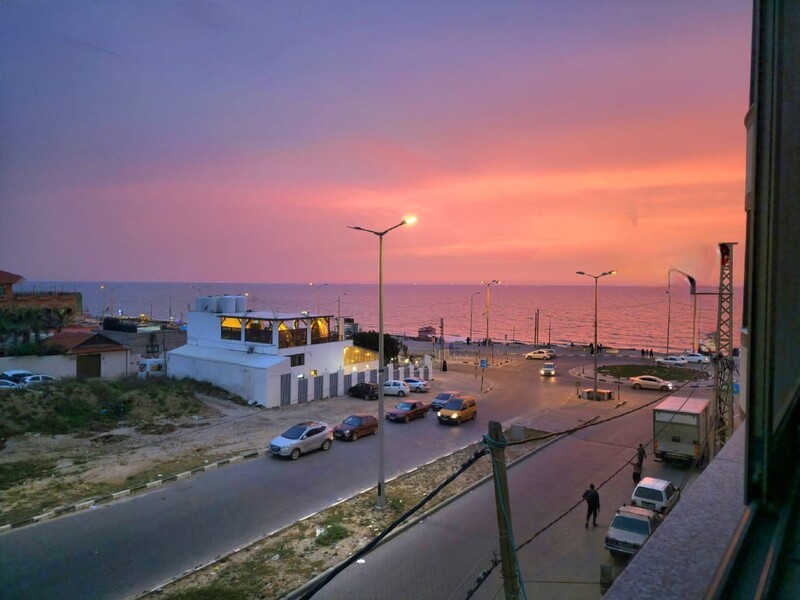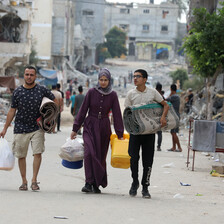The Electronic Intifada 7 February 2025

The view from Roaa Shamallakh’s home before it was attacked by Israel. (Photo courtesy of the author)
What would you pack if you had six minutes to abandon everything you had ever built?
In Gaza, six minutes is not time – it’s a cruel ultimatum.
Six minutes is not enough for grieving, thinking or even breathing.
The air outside was suffocating, heavy with smoke and the stench of destruction. The ground under my feet was shaking with each bomb that fell.
The F-16s roared overhead with their deafening engines. My home, my refuge, shook violently as if it knew its end was near.
“You have six minutes. Pack your things. Run.”
The words didn’t just echo in the room; they carved through me like a blade, leaving only panic in their wake.
Six minutes. That was all I had.
Six minutes to decide which fragments of my life would follow me – and which ones would stay behind to burn.
One
I froze.
My room, my sanctuary, was no longer mine. The bookshelves stood solemnly against the wall, the books on them lined up like soldiers.
These weren’t just books; they were lifelines. Some had carried me through the darkest nights of siege, while others had waited patiently, their stories unopened, promising a future that now seemed impossible.
My hand trembled as I reached out, desperate to save even one.
But how do you save a library in six minutes?
How do you carry the worlds you have built when your own is being torn apart?
Two
I tore my gaze away and turned to my desk, where my yellow and pink sticky notes curled at the edges like dying leaves.
Scholarship deadlines.
Research ideas.
Reminders to apply for a master’s degree in literature.
Each note was a step toward the life I had envisioned; a life of poetry and prose.
But promises don’t fit in a backpack. Dreams don’t survive the fire.
Three
My eyes landed on my laptop. It wasn’t just a device for me; it was another lifeline.
Inside it were the pieces of a life I had been building: essays I had poured myself into, drafts of unsent applications and stories I hoped to finish one day. I reached for it without thinking, sliding it into the bag as if I could somehow carry my future with me.
Next to it were my papers – my birth and high school certificates and identification documents. Thin, fragile pages, but they carried the weight of my existence.
Without them, I would lose not just my home but my place in the world. My hands moved quickly, shoving them into the bag.
Adding these things felt like I was burying my future in a coffin with my bare hands.
I grabbed a jacket from the back of my chair, the first piece of clothing within reach. It wasn’t enough – I knew that.
The seconds ticked louder in my mind as the bag began to feel heavier. The room, though unchanged, seemed to grow smaller, more suffocating.
Four
A wave of panic rose as the minutes slipped away. I turned back toward my desk, grabbing the nearest bottle of water and a small bag of dates. The absurdity struck me like a blow to the chest.
Dates and water against bombs and tanks.
But survival doesn’t allow for logic. You take what you can even when you know it will never be enough.
The dates felt light, too light. It was as if their weightlessness mocked the futility of my effort.
Five
I zipped the bag shut, but my movements felt slow as if the weight of grief had seeped into my limbs. My eyes swept the room one last time.
The bookshelves stared back, accusing me of betrayal. The sticky notes, curling at their edges, seemed to whisper of futures I would never reach.
The air grew heavier with each passing second. The walls of my room seemed to shake off dust and fragments of themselves, as if they, too, were mourning what was about to become ashes.
I ran my fingers along the scratches on my desk, marks carved over years of restless study.
This desk had held my dreams, borne the weight of my books, and witnessed the countless nights I had spent imagining a life far beyond Gaza’s walls.
Now, it was just another thing I could not save.
The house itself seemed alive, pulling at me, begging me to stay, to hold on to a life that was slipping through my fingers.
But I could not.
There was no more time.
Six
The last seconds were suffocating. The walls around me seemed to heave under the weight of their own collapse.
The room was heavy with dust, ash and silence – broken only by the distant roar of planes and the screams of falling bombs.
I pulled the bag over my shoulders. It didn’t feel like salvation; it felt like defeat.
Inside it were scraps of a life – papers, a laptop, dates, water, a jacket. The weight was nothing compared to what I had left behind.
My books, my photographs, the dreams I had scribbled on sticky notes, and the many volumes of journals.
They were still here, abandoned to the flames of the fire that was coming.
This was my room, my home, the only place I had ever been truly myself. And now, I was walking away from it, knowing I would never see it again.
I reached the door. My hand touched the frame.
I wanted to turn back, just for a second, to let my eyes take one last picture of everything that mattered.
But I didn’t. I couldn’t.
Looking back would break me in ways I couldn’t survive.
So, I stepped out, leaving behind a room filled with memories and dreams that would soon become ashes.
Six minutes. That’s all it took to reduce a lifetime to dust.
Months later, when I am supposed to be safe in Egypt, those minutes are still alive, replaying themselves in my mind.
The last look at my walls, my bookshelves, my desk. Every detail is etched into me, refusing to fade.
The air still tastes of dust, the kind that crawls onto your skin and settles in your chest, suffocating you long after the last breath of that life.
It isn’t just the things I left behind; it’s the silence of the loss that followed. A heavy silence seeps into everything I do, into every corner of my new, strange room, where nothing feels like mine.
This kind of agony is a different kind of torment, one born of survival’s cruel aftermath. It drowns out the explosions, cuts deeper than the moment I turned my back, and fills every breath with the weight of what can never be reclaimed.

Roaa Shamallakh’s neighborhood after it was destroyed by Israel.
This is what six minutes of running for survival in a genocide looks like:
One
You freeze, suspended between the life you built and the one you are about to lose.
Two
You reach out, but the weight of everything presses you down. For a moment you cannot move.
Three
You swallow your grief, though it burns your throat, knowing there’s no time to feel it.
Four
You hear the walls groan like they’re alive, mourning alongside you.
Five
You leave without looking back because looking back would break you.
Six
And for the rest of your life, you carry those six minutes with you, etched into your soul, heavier than any burden you could have imagined.
Seneca, a philosopher of ancient Rome, once wrote, “What need is there to weep over parts of life? The whole of it calls for tears.”
But how do you weep for a life that no longer exists? How do you mourn for a home reduced to rubble and ash?
The tears fall, yes, but they are hollow, lost in the void of everything that was taken. They cannot bring back the books left to burn or the walls that held a lifetime of dreams.
The genocide took it all – books, photographs, memories – and left only the suffocating emptiness of absence.
The life I knew dissolved in six relentless minutes, and what remains is a haunting silence. I live inside those minutes now, trapped in the aching pleasure of remembering an old life that no longer exists.
Roaa Shamallakh is a writer and translator from Gaza.




